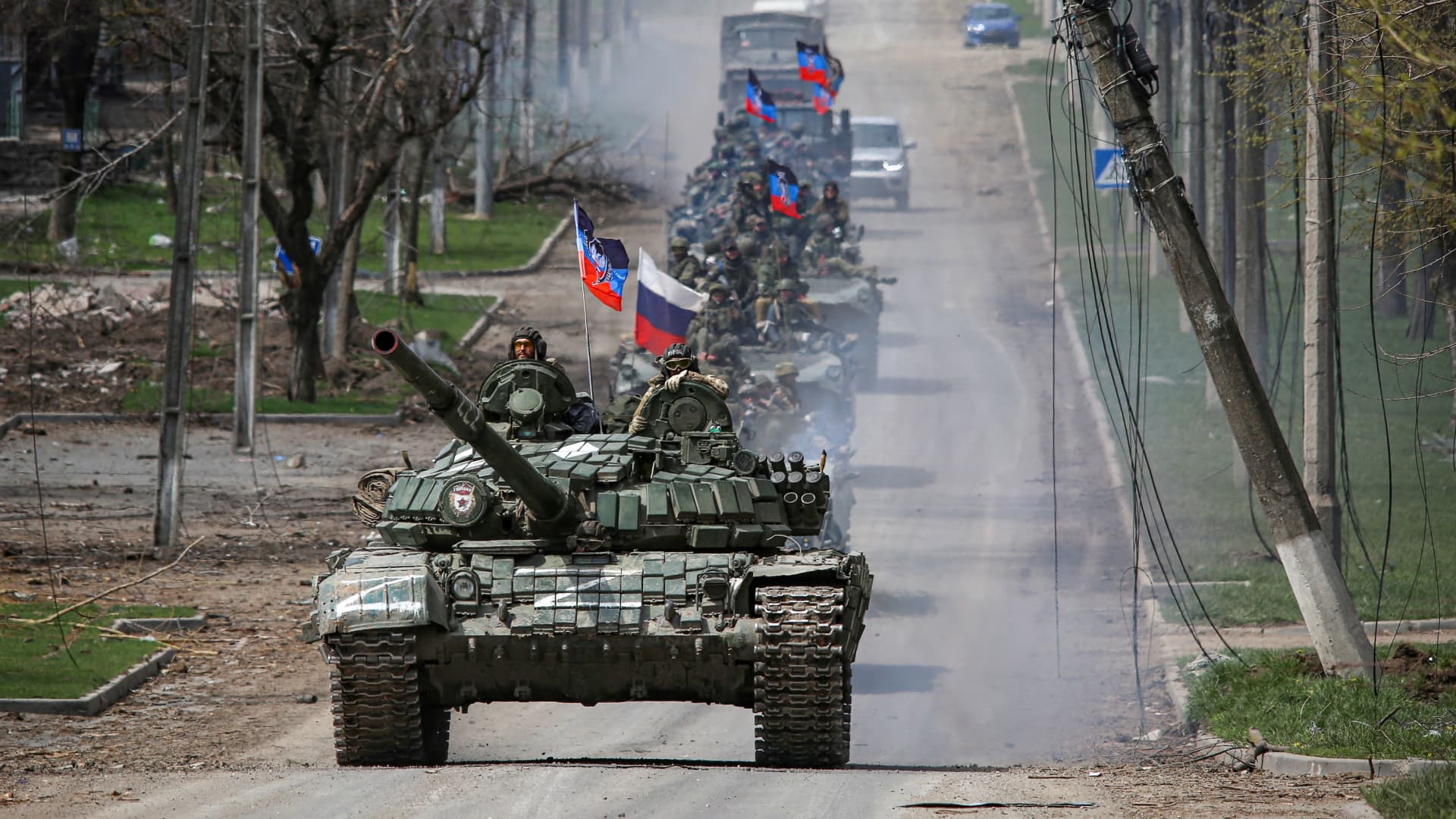An armored convoy of pro-Russian troops moves along a road during the Ukraine-Russia conflict in the southern port city of Mariupol, Ukraine, on April 21, 2022.
Chingis Kondarov | Reuters
Russia’s military has been widely discredited and disparaged by the Western media since the start of its invasion of Ukraine, seen to have bungled the early phase of the war after suffering a series of setbacks and retreats.
But defense analysts at a top London-based military thinktank have investigated Russia’s tactical adaptations during the war and have noted that a more structured, coordinated and reactive armed force has emerged — and one that’s particularly strong on the defensive.
As such, Russia’s military now represents a much more formidable opponent for Ukraine as it prepares to launch a much-anticipated counteroffensive to reclaim occupied territory.
“As Ukraine prepares for offensive operations its armed forces face major tactical challenges,” Jack Watling and Nick Reynolds, specialists in land warfare at the Royal United Services Institute (RUSI), said in their latest report, entitled “Russian Tactics in the Second Year of its Invasion of Ukraine.”
“The depth of [Russian] defences mean that Ukraine must generate serious combat power in order to penetrate the Russian lines, with the extent of Russian defensive fortifications across the front making bypassing them near-impossible,” the report, published Friday, noted.
RUSI’s Nick Reynolds told CNBC that while Russia “put themselves in a very bad position at the start of last year,” conducting what he described as massive strategic and operational blunders that deprived them of some of their best units and equipment, “since then, the Russian state and the Russian military have put themselves on more of a war footing and have been adapting.”
“In particular, a lot of systems and the way they work together are working much better than they were last year. The fact that they’re on the defensive now allows them to combine arms in a way that’s a little bit easier than coordinating offensive operations. They’re also performing [in a way that was] much closer to how they were, pre-war, expected to perform.”
“Basically, Ukrainians have a hard challenge out of them,” Reynolds said Thursday, saying RUSI expected Russia to employ a large amount of artillery fire to defend its units and “very capable” electronic warfare systems aimed at defeating UAVs, or drones.
These are already proving devastatingly effective, with Ukraine losing as many as 10,000 UAVs a month “due to the effectiveness of Russian Electronic Warfare and extensive use of navigational interference,” RUSI said.
Steep learning curve
There’s no doubt among Western defense experts that Russia’s military campaign in Ukraine in 2022 generally went badly.
Russia bit off far more than it could chew when it tried to invade its neighbor from the north, east and south early last year and was forced to make several humiliating retreats, most notably from the Ukrainian capital Kyiv.
Similar successes were seen as Ukrainian forces launched counteroffensives to recapture swathes of occupied territory around Kharkiv in the northeast of the country. Then, in October, Russian troops withdrew from part of the Kherson region in the south.
The Russian military’s poor performance was widely blamed on poor planning, equipment and logistics, ill-equipped and inadequately trained troops in insufficient numbers to sustain wide-scale combat operations and, fundamentally, an underestimation of both the resistance Ukraine would mount against Russia and the strength of international support for Kyiv, particularly in terms of the billions of dollars’ worth of military hardware.
Russian President Vladimir Putin attends a concert marking the eighth anniversary of Russia’s annexation of Crimea from Ukraine at the Luzhniki stadium in Moscow on March 18, 2022.
Mikhail Klimentyev | Afp | Getty Images
Despite Russia’s setbacks, President Vladimir Putin and the Kremlin have dug their heels in, ramping up the anti-Ukrainian and anti-Western rhetoric and pitching the war, or “special military operation” as an existential question for Russia and a matter of its survival.
On the battlefield, meanwhile, neither Russia nor Ukraine have been able to claim any significant territorial gains over winter and into spring, with Ukrainian hopes now riding on a counteroffensive to be launched soon, though no one knows when or where it will begin.
RUSI’s analysts say Russia’s military still has deficiencies and weaknesses — the foremost being low morale across Russian infantry units — but they warned that it would be foolish to ridicule or write-off Russia’s armed forces, or to become complacent about their imminent defeat at the hands of Ukraine.
“There’s no smoke without fire and parts of the Russian military, particularly their line ground combat formations have performed very poorly, but at the same time they’re not useless, they pack a lot of firepower and the Russian military is still in the fight,” Reynolds said.
“The components in the Russian military system, particularly some of the ground combat units, are outperformed certainly by NATO military standards, I’d say they also are out-performed by the Ukrainians. And I think, in particular, sort of a lack of a clear rationale for why they’re fighting and very poor morale are impediments to the Russians achieving their goal — but they’re still in operations and they’re still holding ground.”
What does this mean for Ukraine’s much-anticipated counteroffensive? Reynolds said it was hard and unwise to make predictions but did not underestimate the challenge Ukraine faces, with an expectation of more deadly attritional warfare with steep personnel losses for both sides and slow, grinding gains, or losses, of territory.
“Even if the Ukrainians perform very, very well, they will have to initially breach through Russian defensive lines and they will have to mop up Russian defensive positions. So there’ll be attritional fighting, there’ll be assaults on fixed defensive positions on some level. So it’ll be difficult.”


